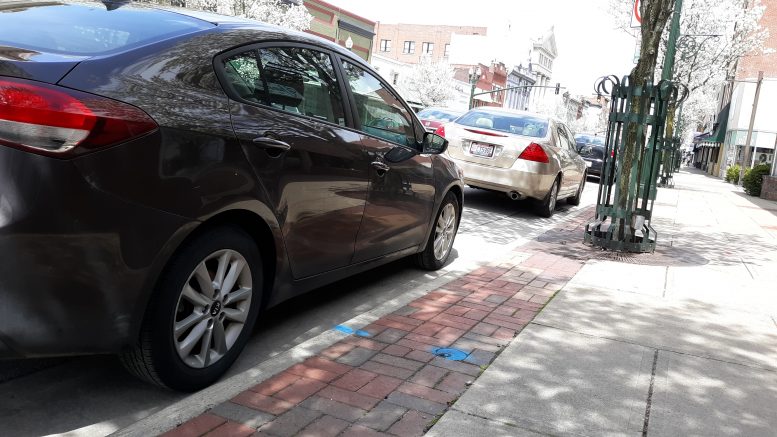By JAN LARSON McLAUGHLIN
BG Independent News
Downtown drivers dreading the chalk marks on their tires, followed by parking tickets on their windows, don’t have to worry – at least for now.
A federal court ruling in Saginaw, Michigan, on Monday found that chalk marking on tires in order to restrict the time that a car can remain in a parking spot is unconstitutional.
That’s right – unconstitutional.
And Bowling Green officials took note, with police parking technicians no longer marking tires with chalk.
“They have stopped doing it as of yesterday morning,” Assistant Municipal Administrator Joe Fawcett said on Wednesday.
The Michigan case involved a woman named Alison Taylor, who had received 15 parking tickets during a three-year period in Saginaw.
Taylor’s lawyer argued that the city’s physical marking with chalk, done to note how long a vehicle is parked, amounted to searching without a warrant — a violation of the Fourth Amendment. The 6th U.S. Circuit Court of Appeals panel unanimously agreed.
The chalk marking is done prior to the driver violating the parking time limits, “without probable cause or even so much as ‘individualized suspicion of wrongdoing’ — the touchstone of the reasonableness standard,” the court opinion stated.
The Fourth Amendment protects against “unreasonable searches and seizures.” And the city’s chalking of cars “to raise revenue” does not qualify as a public safety concern that could allow a search without a warrant, the court said.
The court’s decision affects Michigan, Ohio, Kentucky and Tennessee.
“The police division was made aware of that,” Fawcett said. “We started immediately talking in earnest about our options.”
Bowling Green currently chalks tires on vehicles parked on downtown streets. If the vehicles are still there more than two hours later when the parking technician passes by, the drivers receive parking tickets.
In residential areas, the parking rules allow vehicles to remain in the same spot on the street for no more than 24 hours.
The new ruling limits municipalities because parking technicians can no longer touch a vehicle. So one option may be taking photos of cars, while another may be chalking around the tires where they sit on the asphalt.
“I think it is going to be challenging for us to come up with a different way to enforce timed parking,” Fawcett said.
Turning to other communities for ideas isn’t really an option yet. “A majority of them chalk,” he said.
The two-hour parking limit in the downtown area was enacted at the request of downtown business owners, who didn’t want motorists to monopolize the parking spaces for long periods, Fawcett said.
“They want to have turnover on the streets and in the parking lots,” Fawcett said.
“This has ramifications for the community,” he said.

